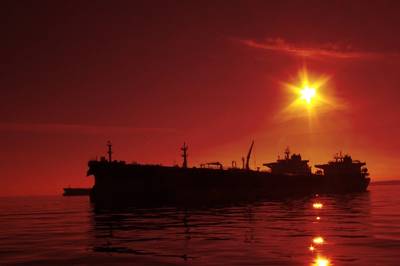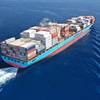World's Ghost Fleet in Focus Over US Russian Price Cap Crackdown
U.S. penalties on shippers transporting Russian oil in breach of the G7's price cap could push more Russian cargoes onto vessels referred to as the ghost fleet and away from mainstream tankers, shipping sources and analysts told Reuters.
The cap bans Western companies from providing maritime services for Russian seaborne oil exports sold above $60 a barrel.
It was designed to keep oil flowing to markets while reducing Russia's energy earnings that it can use to finance its war on Ukraine, but it has created a two-tier global shipping market.
One tier relies on vessels known as the ghost fleet that are past their traditional lifespans, meaning they are at greater risk of leaks and spills.
The other tier comprises mainstream vessels that use Western services for legal oil shipments, including from Russia under the terms of the price cap.
Most of the dozen industry insiders and analysts interviewed by Reuters said the United States' enforcement of the price cap was likely to deter G7-owners from Russian crude trade, at least in the short term.
They cited the increased risks and costs of proving their cargoes are price-cap compliant and said the consequence could be that more ghost vessels are used for Russian shipments.
Western tanker owners have already reduced price cap shipments in recent months because of concerns a rally in global oil prices meant Russian crude values had exceeded the $60 a barrel limit.
Major shipowners including Teekay, Euronav, and Maersk, either did not immediately respond to Reuters' requests for comment or declined to comment.
The proportion of Russian crude exports loaded onto EU-based vessels fell to around 20% in October from 35% in June, said Ioannis Papadimitriou of analytics firm Vortexa.
On Oct. 12, the White House for the first time since the introduction of the price cap in December, imposed sanctions on two tankers - registered in Turkey and the United Arab Emirates - it said for carrying Russian oil in breach of the cap while using U.S. services.
Shipowners may also be discouraged from Russian voyages if energy majors tighten vessel requirements because of the sanctions.
Big oil companies, including Shell SHEL.L and BP BP.L, have already been avoiding tankers known to carry Russian crude, industry sources say.
U.S oil giant Exxon Mobil found itself caught up in the furore as it had previously chartered one of the tankers the U.S. imposed sanctions on - the Yasa Golden Bosphorus. There was no suggestion Exxon breached any regulations.
As some of the largest movers of oil globally, it would be a "big disincentive" to independent G-7 based owners to continue with price cap voyages if energy majors were to avoid them, Mike Salthouse of NorthStandard P&I club said.
Increased scrutiny needed to avoid problems could make costs prohibitive.
“Everyone is going to be triple checking everything they are doing is above board. That comes at a cost, and that drives freight rates higher,” energy consultants FGE told Reuters.
U.S. sanctions have already lifted freight rates, shipping sources told Reuters.
For instance, oil freight rates from Russia's Baltic ports to India, had been particularly affected by the U.S. price cap action as India has been one of the main buyers of Russian fuel since the outbreak of the Ukraine war.
However, the impact of higher Russian freight rates has been masked by a global rise in freight costs as the potential for an escalating conflict in the Middle East added a risk premium to shipping.
MORE GHOSTS?
In the short term, available ghost vessels could be in particular demand, making chartering them more expensive.
But in the longer term, increased purchases of secondhand vessels could swell the ghost fleet, Vortexa’s Papadimitriou said.
Ghost fleet vessels, which tend to be older, are covered by non-Western, rather than Western insurance, which the U.S. Treasury has warned about, given potential environmental risks.
“These ships may be unable to pay the costs of accidents in which they are involved, including oil spills, which entail tremendous environmental damage and safety risks and associated costs,” the Treasury said in an accompanying statement the day it imposed sanctions.
Shipowners will also weigh how serious sanctions on price-cap breaches are likely to be, industry insiders said.
Richard Bronze from Energy Aspects said the market has taken note that the imposition of the first sanctions focused on niche Russian crude grade Novy Port and the Pacific grade ESPO Blend, which are usually more expensive than Russia's main export grade Urals.
The sanctions on the vessels involved in carrying Urals that sold above the cap could have sent a stronger signal, Bronze said.
Even so, some analysts say removing the price cap could be the way to really punish Russia.
Adi Imsirovic, director at consultant Surrey Clean Energy and a veteran oil trader, said that if the G7 really wanted to hurt Russia it should remove the cap, let the EU/UK sanctions work, and deploy secondary sanctions against those companies and countries that buy Russian oil.
But he said that was very unlikely because the price cap at least allows Russian oil to flow, thereby moderating international prices.
"The Biden administration is already reeling from higher oil prices compounded by the unrest in Gaza, potentially spreading to a wider Middle Eastern conflict. The last thing the administration wants is even higher crude prices in the global market, leading to higher gasoline prices in the US," he said.
Russian crude exports by grade in 2023 https://tmsnrt.rs/3S6CMdk
Russian crude exports by grade in 2023 https://tmsnrt.rs/494vE7h
(Reuters - Reporting by Natalie Grover and Robert Harvey in London; Additional reporting by Julia Payne in Brussels and Andrea Shalal in Washington; Editing by Barbara Lewis)











